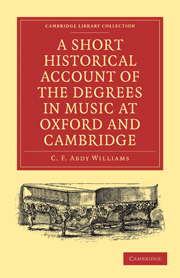 A Short Historical Account of the Degrees in Music at Oxford and Cambridge
A Short Historical Account of the Degrees in Music at Oxford and Cambridge Book contents
- Frontmatter
- PREFACE
- Contents
- CHAPTER I THE ORIGIN OF ACADEMICAL DEGREES IN GENERAL
- CHAPTER II THE EARLIEST RECORDS OF DEGREES IN MUSIC
- CHAPTER III EARLY MUSICAL STUDY AT THE UNIVERSITIES.—BOETHIUS
- CHAPTER IV THE MUSIC ACT, MUSIC SPEECH OR LECTURE, AND MUSIC SCHOOL
- CHAPTER V THE ESTABLISHMENT OF PROFESSORS OF MUSIC AT THE UNIVERSITIES
- CHAPTER VI DEVELOPMENT OF THE MODERN REQUIREMENTS FOR MUSICAL DEGREES
- CHAPTER VII THE CULTIVATION OF MUSIC AT THE UNIVERSITIES
- CHAPTER VIII ACADEMICAL DRESS.—DEGREE CEREMONIES, FEASTS.—AN EARLY EXAMINATION FOR THE B.A. DEGREE
- CHAPTER IX OXFORD GRADUATES IN MUSIC, WITH BIOGRAPHICAL SKETCHES
- CHAPTER X CAMBRIDGE GRADUATES IN MUSIC, WITH BIOGRAPHICAL SKETCHES
- APPENDIX: CONTAINING ACCOUNTS OF THOSE PERSONS WHO ARE MENTIONED IN HISTORY AS GRADUATES, BUT WHOSE NAMES DO NOT APPEAR IN THE UNIVERSITY RECORDS
- INDEX
CHAPTER II - THE EARLIEST RECORDS OF DEGREES IN MUSIC
Published online by Cambridge University Press: 05 October 2010
- Frontmatter
- PREFACE
- Contents
- CHAPTER I THE ORIGIN OF ACADEMICAL DEGREES IN GENERAL
- CHAPTER II THE EARLIEST RECORDS OF DEGREES IN MUSIC
- CHAPTER III EARLY MUSICAL STUDY AT THE UNIVERSITIES.—BOETHIUS
- CHAPTER IV THE MUSIC ACT, MUSIC SPEECH OR LECTURE, AND MUSIC SCHOOL
- CHAPTER V THE ESTABLISHMENT OF PROFESSORS OF MUSIC AT THE UNIVERSITIES
- CHAPTER VI DEVELOPMENT OF THE MODERN REQUIREMENTS FOR MUSICAL DEGREES
- CHAPTER VII THE CULTIVATION OF MUSIC AT THE UNIVERSITIES
- CHAPTER VIII ACADEMICAL DRESS.—DEGREE CEREMONIES, FEASTS.—AN EARLY EXAMINATION FOR THE B.A. DEGREE
- CHAPTER IX OXFORD GRADUATES IN MUSIC, WITH BIOGRAPHICAL SKETCHES
- CHAPTER X CAMBRIDGE GRADUATES IN MUSIC, WITH BIOGRAPHICAL SKETCHES
- APPENDIX: CONTAINING ACCOUNTS OF THOSE PERSONS WHO ARE MENTIONED IN HISTORY AS GRADUATES, BUT WHOSE NAMES DO NOT APPEAR IN THE UNIVERSITY RECORDS
- INDEX
Summary
It is not known when these degrees were first conferred by Oxford and Cambridge, and they have never been given by foreign Universities. Some foreign writers have considered that they originated in the practice of giving degrees in the single arts of the seven liberal studies; and there is a certain amount of reason for this view, for they were similar to the grammar degrees, in that no residence was required, and that they did not confer full membership of the University on the recipient.
My own view is that they were considered more honourable than degrees in grammar, and that the Doctorate in Music was at first conferred only on musicians of eminence, and without examination. It is known that, in the Middle Ages, music took a very high rank in public estimation in England, and English musicians had considerable reputation abroad. MSS. have recently been found at Modena, Bologna, and among the capitular archives of Trent, dating from the latter part of the fifteenth century, which contain compositions by Dunstable, John Benet, Forest, Power, Stowe, and others, showing that the music of English composers was known and appreciated abroad. There is evidence, moreover, that Dunstable preceded Dufay and Binchois by some years, and that the early English School of music, the development of which was crushed by the general disturbance of all the arts of peace caused by the Wars of the Roses, was flourishing before the rise of the Netherlands School.
- Type
- Chapter
- Information
- A Short Historical Account of the Degrees in Music at Oxford and CambridgeWith a Chronological List of Graduates in that Faculty from the Year 1463, pp. 13 - 19Publisher: Cambridge University PressPrint publication year: 2009First published in: 1893


